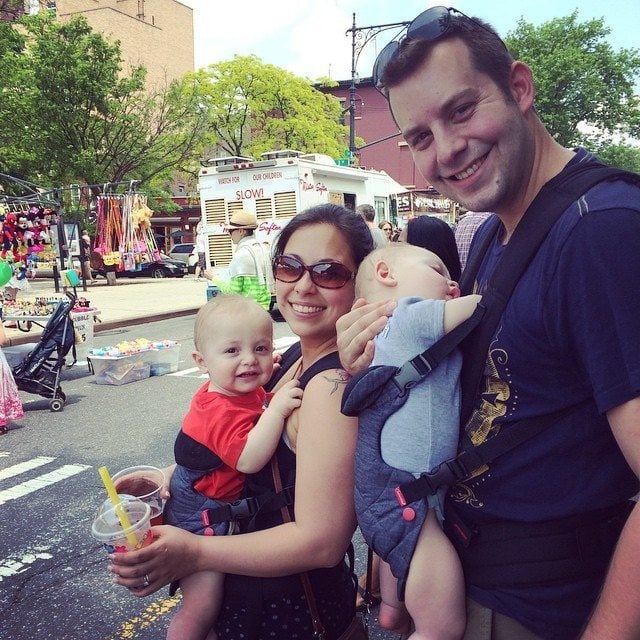Last updated on February 14th, 2024 at 10:30 pm
I think I’ve always been pretty good with money. I remember at my first job as a waitress I pinched pennies until I had exactly $1,000 in my bank account and then I was kind of neurotic to keep it in there. When I was a teenager, my parents agreed to pay for half a drum set and I could pay for the other half. I scrimped and saved every holiday and birthday dollar I got. I did chores around the house, until I had $250 to put toward the $500 set. I think I was actually more frugal when I was younger, which makes no sense at all since now I have bills to pay and little people that depend on me. Before I had kids, I had just started working my first corporate job and entered the magical and dangerous world of direct deposit. Every two weeks, my account would magically fill up and my boyfriend (who is now my husband) and I would splurge on vacations, dinners, clothes, electronics, and other things 20-somethings think are important and necessary.

When I found out I was pregnant, I knew we were going to have to make some changes, but it didn’t really occur to me to what extent that would be. And when we found out it was twins, we figured, “okay, we’ll probably have to cut cable, or stop buying coffees every morning.” At the time, I was living in a different state than where I worked, and my husband was a part-time actor, part-time teacher. As the babies became more of a reality, it deeply dawned on us that we were going to have to do more than cut the cable (cutting out coffee was the opposite of what we ended up doing, for obvious reasons. We became coffaholics). Still, I figured we were going to be able to scratch off a bunch of big ticket items after the baby shower.

Our boys arrived in June 2014, and almost immediately hospital bills poured in. Not only that, but because of my high-risk pregnancy, I was in the hospital a lot during pregnancy either because I hadn’t felt the babies move for a few hours and freaked out, or I was having pain and needed to be checked out. Those things weren’t covered by my health insurance plan. But in the haze of new parenthood, I didn’t really pay attention to the debt already piling up. Strike one.
My husband and I invested in a second car and took out a second auto loan since we a) needed a car big enough to fit a double stroller and two car seats and b) needed two cars once we were both working again. Strike two.

Strike three was the realization over time that those big ticket items we got at our shower were a one-time payment. Yes, we were grateful and lucky to have gotten car seats, a stroller, swings, bouncers, cribs and all those things as gifts, but it’s the recurring costs of diapers, formula, clothing (THEY GROW LIKE WEEDS), and baby food that drain your bank account. As brand new parents of twins, we favored convenience over practicality. We bought baby food instead of making it, we invested in a Keurig and justified it would save us money not going through the drive-thru every four hours. I joined Amazon Mom and had auto-shipments of diapers, formula, and wipes every month which totaled about $450/mo. Then they started eating real food. Then I went back to work and we needed a nanny (the best price we could find with someone who we felt safe with was still $2,000 a month, more than we paid in rent – and that was a steal.)
My dad always told me that JUST as you’re starting to go broke, they’ll move onto the next phase, whether it’s formula to milk, or diapers to potty trained, and that expense will go away. But he never dealt with two phases at once and we were starting to feel like we’d never dig our way out of debt.

We did everything we could from cutting cable to negotiating lower cell phone contracts to being choosy about where we got gas to making meal plans and grocery lists with coupons, but we still were living paycheck to paycheck (even as my husband got a full-time job in the city). We weren’t making peanuts, but we also weren’t really tracking our money. We would start a budgeting Excel document and never look at it again. It affected our relationship both in the day to day and the big picture. It was something that frustrated us to no end, but discussing it always ended in a blow up. We needed to think of an alternative – and fast.
Then I came across an article that detailed the 70-20-10 method of budgeting. It saved us. Because my husband and I made different amounts, the portion of your paycheck that was set aside was percentage-based, and therefore more fair. So 70% of every bi-monthly paycheck went into a joint bank account to pay all the household bills, including rent, utilities, car payments, transportation, groceries, and baby stuff. 20% went toward debt, both personal and joint. We have one shared credit card that has racked up a few thousand dollars in a short time, plus hospital bills. We both put a portion of our 20% toward those, and then the rest goes toward personal debt and student loans.

The remaining 10% goes to savings. 10% seems small, but in one month’s time, a good chunk of our overall monthly income is going to savings since we put in a collective 20% each, twice a month. If we have anything left over in our 70% pool at the end of the month, it’s spending money. We can split it and do with it what we want, no questions asked (or judgement)! Sometimes we spend it, and sometimes we leave it in there for padding. But either way, EVERY SINGLE MONTH we know that our bills will be covered, our debts will slowly be paid off, and we still have enough to put something into the savings for emergencies. Of course, you have to add up all your expenses and make sure 70% covers them. Otherwise, you may have to shift that percentage to 80-10-10 or another breakdown that suits your situation.
I can’t praise this method enough. It’s saved our sanity and I would even go so far to say our marriage. We no longer argue and bicker over who has to pay what bill, or fume over someone’s impulse purchase. So, yes, we could probably be living much more luxuriously without kids, but our kids have already taught us such important lessons about what truly matters: our personal relationships, managing our time and money more wisely, and most importantly, efficiently dealing with an issue so we can soak up and enjoy our time as a family, rather than stressing about all the financial hardships having a family can stir up.







